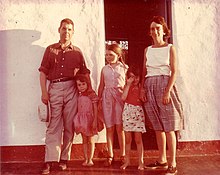Lisa Peattie
Lisa Peattie | |
|---|---|
Ph.D. ) | |
| Known for | Advocacy planning |
| Spouse |
Roderick Elia Peattie
(m. 1943; died 1963) |
| Awards | ACSP Distinguished Educator Award |
| Scientific career | |
| Fields | Urban Anthropology |
| Institutions | Massachusetts Institute of Technology |
| Thesis | (1968) |
Lisa Redfield Peattie (1924–2018)
Biography
Born in
She began her anthropological life in 1948 with the Fox Project, which began as a summer of fieldwork for six Chicago graduate students, at Meskwaki Settlement in Iowa, and which, with the encouragement of Sol Tax, became a decade-long effort to redefine anthropology not as pure science, but as part of the human and moral landscape, in what he called "action anthropology", and which was later to reappear in her urban planning work as "advocacy planning".[12][13][14]
In 1943 she married Roderick Elia Peattie. She published two children’s books with him: The Law[15] and The City,[16] which began her lifelong study of cities.
In 1962 Lisa and Roderick Peattie were hired by the

Roderick Peattie died in Venezuela, in a car accident in 1963. Lisa Peattie returned to the United States, where she taught urban planning at MIT until her retirement.
In 1966 she, with other faculty and students of M.I.T. and Harvard, organized Urban Planning Aid. This organization was to offer assistance to local residents against highway construction, and housing problems. It took an active part in the
She inspired activists in such widely varied subjects as poverty and conviviality.[20][21] She also was involved in the Homeless Empowerment Project, and in the creation of "Spare Change News", a street newspaper whose mission is "to present, by our own example, that homeless and economically disadvantaged people, with the proper resources, empowerment, opportunity, and encouragement are capable of creating change for ourselves in society."[22] She also became involved in the fight against nuclear arms.[6][23]
Awards
- ACSP Distinguished Educator Award (1999)[24]
Books and articles
- The View From The Barrio. ISBN 9780472722808.
- The informal sector: A few facts from Bogota, some comments and a list of issues. 1974. OCLC 30427428.
- Living poor: A view from the bottom. Urban poverty, a comparison of the Latin American and the United States experience, v. 4. Los Angeles : School of Architecture and Urban Planning, University of California. 1975. OCLC 3785333.
- Thinking about Development. Springer. 1982. ISBN 978-0306407611.
- "Women's Claims: A Study in Political Economy (The Library of Political Economy)", with Martin Rein, ISBN 978-0198771807
- Planning: Rethinking Ciudad Guayana. University of Michigan Press. 1987. ISBN 978-0472080694.
- New politics, the state, and planning. UCLA, Graduate School of Architecture and Urban Planning. 1987. OCLC 22261853.
- Planners and protesters: Airport opposition as social movement. Institute for Urban Studies monograph series, no. 9. University of Maryland at College Park, Institute for Urban Studies. 1991. ISBN 9780913749197.
References
- ^ "Remembering Lisa Peattie | MIT Department of Urban Studies and Planning". dusp.mit.edu.
- ^ "Lisa Redfield Peattie Obituary". www.currentobituary.com.
- ^ .
- ^ Newsletter of the American Anthropological Association. 1972. Retrieved 7 December 2014.
- ^ "Protestors arrested at rally - The Tech". Tech.mit.edu. Retrieved 7 December 2014.
- ^ a b "Commonweal Commonweal - One night in the Beatty lockup". Search.opinionarchves.com. Retrieved 7 December 2014.
- ^ "Lisa Peattie, professor emerita of urban studies and planning, dies at 94". MIT News. January 14, 2019. Archived from the original on April 1, 2020. Retrieved April 1, 2020.
- Doubleday & Co., New York, 1912
- ^ "Robert E. Park, Sociology". Lib.uchicago.edu. Retrieved 7 December 2014.
- ISBN 0-7658-0333-X.
- ISBN 0-7658-0735-1.
- ^ "The University of Chicago Magazine: April 2004". Magazine.uchicago.edu. Retrieved 7 December 2014.
- ISBN 9781412816632– via Google Books.
- ^ "Metapress | A Fast Growing Resource for Young Entrepreneurs". December 14, 2017.
- ^ "The Law: What It is and How It Works", Peattie, Rod and Lisa, Henry Schuman, New York 1952
- ^ "The City", Peattie, Rod And Lisa Henry Schuman,, NY: 1952
- ISBN 978-0198771807.
- ^ "Village Life in the Global Economy" (PDF). Lisa Peattie Massachusetts Institute of Technology 2003. Retrieved 7 December 2014.
- ^ "Urban Planning Aid : Records, 1966-1982". Lib.umb.edu. Archived from the original on 19 December 2014. Retrieved 7 December 2014.
- ^ "What if there is no water? ( Zainab)". Teaser. 7 April 2007. Retrieved 7 December 2014.
- ^ Wendy Pollock (August 1, 2011). "Setting the Stage for Conviviality" Exhibit Files, "Convivial Cities"".
- ^ Harris, Timothy. "Lisa Redfield Peattie". Real Change News. 15 (47l).[permanent dead link]
- ^ Bulletin of the Atomic Scientists. Educational Foundation for Nuclear Science. March 1982. p. 32. Retrieved 7 December 2014 – via Internet Archive.
lisa peattie.
- ^ "ACSP Award History - ACSP: Association of Collegiate Schools of Planning". Acsp.org. Archived from the original on 9 December 2014. Retrieved 7 December 2014.
External links
| Archives at | ||||||
|---|---|---|---|---|---|---|
|
||||||
| How to use archival material |
